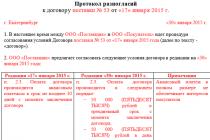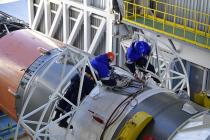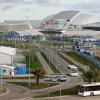Not everyone in our country knows what a “brain drain” is. Less than 90% of Russians have heard something about it, and only about 60% know exactly what it is. Meanwhile, this issue is important and serious, because this process significantly affects the most diverse spheres of society.
"Brain drain" is a global outflow (emigration) of scientists associated with negative changes in the country. Since the beginning of the nineties, when the Soviet regime collapsed with a bang, and a crisis set in in Russia, which was especially pronounced in economic spheres, a significant part of certified doctors, researchers and other representatives of the scientific world decided to change their place of residence, going to other countries. Thus, in less than 10 years, the number of specialists has halved. The brain drain continues today. Perhaps not so actively, but its results are quite noticeable.
However, the crisis is a common cause that does not fully form the picture of the current problem. The consequence of the negative economic situation in the country was that the state directed the main budget funds to the development of other areas, forgetting about the scientific fields. Thus, there was practically no money that would be enough for the normal existence of the research world (not to mention the possibility of new discoveries and support for innovations). And the “brain drain” began to occur for the reason that they were ready to offer scientists not only a sufficient amount financial resources but also a socially worthy existence.

The intellectual level of a country is not so much a quantitative as a qualitative indicator. And the problem of the “brain drain” is that qualified personnel who are citizens of Russia and are able to bring significant benefits to their homeland are employed abroad. The percentage of such people from the total number of scientists is approximately 80. The remaining 20 theoretically and practically can make real discoveries made by them, they can significantly accelerate technical progress, bringing Russia to a new level of development.
They tried to correct the negative trend in various ways. For example, in some countries, according to the Institute for the Study of Labor, it was officially forbidden to emigrate highly qualified teachers and doctors. However, even considering this fact, people found ways to change their place of residence.

"Brain drain" has several directions. It doesn't have to be a trip abroad. Quite often, promising scientists or students who have graduated from universities decide to retrain, working, for example, in the service sector. The so-called "leak of ideas" is not uncommon: scientists do not leave the country, they simply sell their projects and ideas to foreign customers. In addition, very often Russian researchers collaborate with employers from other countries. And there is only one reason - the state does not want or cannot provide the scientific sector with a sufficient amount of finance. That is why the problem of "brain drain" is one of the most urgent today.
"Brain drain" is one of the forms of migratory behavior. Departure, emigration, travel abroad for permanent work of highly qualified specialists who do not find application for their abilities or do not receive the expected return, are not in demand in the country of residence.
Share work on social networks
If this work does not suit you, there is a list of similar works at the bottom of the page. You can also use the search button
Other related works that may interest you.vshm> |
|||
| 16898. | The Need for a Conceptual Understanding of the Brain Drain Problem as a Necessary Prerequisite for Solving it for Modern Russia in the Context of Globalization | 20.29KB | |
| The need for a conceptual understanding of the problem of brain drain as a necessary prerequisite for its solution for modern Russia in the context of globalization Currently, there is a third wave of interest in the problem of brain drain in domestic discursive practice. It is for the above reasons that this problem has particularly excited Russian society, which has already realized that this process of brain drain will have no less and possibly more serious consequences for the economic and spiritual development of Russia than ... | |||
| 21746. | Transnational banks in the global economy | 27.45KB | |
| Modern TNCs, in addition to the existing international exchange of goods and services, have created international production and financial sector contributing to the transformation of mostly local intercountry regional international economic relations into global ones. TNCs are playing a leading role in the internationalization of production, an increasingly widespread process of expanding and deepening production links between enterprises. different countries. The main factor in the effectiveness of TNCs is the international ... | |||
| 10422. | Currency relations in the world economy | 146.59KB | |
| The concept of national and foreign currency. Currency convertibility Factors determining exchange rates. When studying the topic, you need to focus on the following concepts: National currency; foreign currency; international currency; Eurocurrency; currency convertibility nominal exchange rate; real exchange rate; fixed exchange rate; free floating exchange rate; gold standard; Parisian system gold standard; Bretton Woods currency system gold dollar standard... | |||
| 16812. | Formation of mega-regions in the global and national economy | 22.28KB | |
| Andreeva in the report World experience in the development of megaregions at the round table meeting Megaregions in the Eurasian socio-economic space: prospects for the transformation of integration and development7 held in June 2009. The formation of megaregions of the first and second types occurs in the process of different speed and different formats of development of integration processes in the Eurasian space. The use of its various forms becomes an important factor development and competitiveness of the economies of contact areas and economies... | |||
| 16314. | And the South Caucasus South Caucasus in the modern world economy. | 12.53KB | |
| The use of such an indicator as the number of scientific and technical articles seems appropriate since it indirectly characterizes the number and scope of research experiments and experiments. The US National Science Foundation publication âScience nd Engineering Indictorsâ provides data on the number of articles published by scientists from different countries; the calculation is based on the data of citation indices of scientific articles Science Cittion Index hereinafter SCI and Socil Sciences Cittion Index hereinafter SSCI including, respectively... | |||
| 11333. | The United Nations, its role in the world economy | 37.35KB | |
| International economic organizations, carrying out regulation in the system of the world economy, can be classified according to two main principles: according to the organizational principle and according to the sphere of multilateral regulation. | |||
| 10008. | THE PROBLEM OF CREDIT DEBT AS A FACTOR OF INSTABILITY OF THE MODERN WORLD ECONOMY | 52.97KB | |
| Problem external debt and instability of international credit. The problem of servicing the public external debt is one of the key factors macroeconomic stability in the country. The aim of the work is to study the system of international lending to solve the problem of external debt, to show the problems of external debt of Russia and foreign states, their dependence on this debt and the prospects for the development of the situation. To achieve this goal, the following tasks are set in the work: to give the concept and reveal the essence of the international... | |||
| 19592. | Place and role of small and medium enterprises in the world and Russian economy | 104.41KB | |
| Behind last years there has been an unprecedented growth in the number of small and medium-sized enterprises in the world, especially in areas where large investments and maintenance are not required a large number workers.; consider the levels of government support for small and medium enterprises in the US; determine the scope of state support for small and medium-sized enterprises in Europe; formulate differences in the definition of small and medium-sized enterprises in industries and countries; identify factors... | |||
| 16758. | The problem of quantitative measurement of the level of trust in the economy | 19.6KB | |
| Trust in the economy is the key to the development of a market economy financial intermediation. It allows owners of financial resources to trust their financial institutions | |||
| 16482. | Reducing the negative consequences of cyclicality in the global economy from the perspective of the Austrian School of Economics | 37.71KB | |
| Interestingly, Keynes saw one of the causes of the Great Depression as people's excessive propensity to save. Nobel Laureate Friedrich August von Hayek and Jesús Huerta de Soto proved quite convincingly that the decline in individual savings actually leads to a decline in investment and economic growth, primarily in non-manufacturing industries. consumer goods which adversely affects the economy as a whole. he wrote that often an individual serves the industrial system not by supplying it with savings, and therefore ... | |||
Short description
In recent years, there has been a marked increase in global attention to human capital strengthened the understanding that it is a determining factor in development. There is a steady upward trend in the number of personnel involved in R&D in relation to the total number of employees. Thus, in Finland in the field of intellectual activity there are more than 200 people per 10,000 employed, in Sweden - over 150, in France and Japan - 135, and in the EU on average - 105. economic cooperation and Development (OECD), last year the number of researchers (based on full-time employment) amounted to approximately 3.4 million people. The demand for knowledge and highly qualified specialists is constantly growing.
Introduction 3
1. "Brain drain" as a global phenomenon. five
2. Different points of view on the problems of "brain drain" from Russia. 10
3. Causes of the "brain drain" from Russia. 12
3.1 Historical reasons. 12
3.2 Reasons modern leak minds 12
3.3 Modern system"brain drain" 14
3.4 Consequences of "brain drain". fifteen
4. Russian Academy of Sciences and scientific and technical potential of Russia. 17
5. Methods of dealing with the problem of "brain drain" from Russia. nineteen
Conclusion 21
References 23
Attached files: 1 file
Introduction 3
1. "Brain drain" as a global phenomenon. five
2. Different points of view on the problems of "brain drain" from Russia. 10
3. Causes of the "brain drain" from Russia. 12
3.1 Historical reasons. 12
3.2 Causes of the modern brain drain 12
3.3 Modern Brain Drain System 14
3.4 Consequences of "brain drain". fifteen
4. Russian Academy of Sciences and scientific and technical potential of Russia. 17
5. Methods of dealing with the problem of "brain drain" from Russia. nineteen
Conclusion 21
References 23
Introduction
The problem of "brain drain" - or the departure of highly qualified specialists from domestic science, production and culture - is the most acute problem of reducing the country's intellectual potential.
In recent years, attention to human capital has noticeably increased in the world, and the understanding that it is a determining factor in development has strengthened. There is a steady upward trend in the number of personnel involved in R&D in relation to the total number of employees. Thus, in Finland in the field of intellectual activity there are more than 200 people per 10,000 employed, in Sweden - over 150, in France and Japan - 135, and in the EU on average - 105. According to the estimates of the Organization for Economic Cooperation and Development (OECD), last year, the number of researchers (per full-time employment) was approximately 3.4 million. The demand for knowledge and highly qualified specialists is constantly growing.
In the last three or four years, some progress has begun to emerge in Russia in solving problems related to restoring the country's intellectual potential. Already in 2004, the problem of "brain drain" was considered at the Council on Science and High Technologies under the President of the Russian Federation. It was noted there that over the years of reforms, the number of scientific personnel has decreased by more than 2 times and now stands at about 800 thousand people. At the same time, it must be remembered that the proportion of scientific workers aged 50 to 70 years is now more than 50%, while at the end of the 80s it did not exceed 27%. (In the US, for comparison, this figure is less than 20%).
The roots of the massive brain drain from Russia are usually found in the general economic crisis of the 1990s, which significantly reduced government support for scientific activity and forced the industry to abandon scientific research, the return from which can only be obtained in the future. The process of "brain drain" abroad began in the early 1990s after the collapse of the USSR, when the country's economic situation deteriorated sharply. Moreover, many Russian scientists who left the country after the collapse of the USSR held leading positions in the scientific community. As a rule, the most gifted specialists went abroad, either being leaders in priority research areas or promising to become such. Meanwhile, the number of people employed in science from 1991 to 1999 more than halved (from 878.5 thousand to 386.8 thousand people). As a result, there are now tens of thousands of Russian scientists working in the United States alone, and the total brain drain abroad is still incalculable. The fact is that official statistics take into account only those specialists who travel to foreign countries for permanent residence. It is known, however, that a massive “brain drain” led to an age gap and a loss of communication between generations in the scientific community of Russia: already in 2000, there were only 10.6% of scientists under the age of 29, 15 aged 30-39, 6%, 40-49 years old - 26.1%, and over 50-47.7%. According to non-governmental sources, between 60,000 and 80,000 scientists left the country in the first half of the 1990s alone. Some researchers estimated Russia's annual loss in the 1990s from the "brain drain" at $50 billion and argued that it caused irreparable damage to the country's intellectual potential.
- "Brain drain" as a global phenomenon.
"Brain drain" is a process in which scientists, specialists and skilled workers emigrate from a country or region for economic, less often political, religious or other reasons. The term is defined by Encyclopedia Britannica as "the migration of educated or professional personnel from one country, sector of the economy or region to another, usually for better pay or living conditions." The expression "brain drain" (Brain Drain) appeared in the early 1950s - in a similar way in the UK they described the process of mass relocation of English scientists to the USA.
For half a century, the size of the global migration of skilled professionals has grown incredibly and is now perceived as a serious threat to the future of many states. On the other hand, supporters of professional migration use other, more neutral names instead of the term "brain drain" - for example, "brain exchange" (Brain Exchange) or "brain mobility" (Brain Mobility) - and emphasize that this process has not only "cons", but also "pluses".
A number of factors influence the movement of qualified personnel. Joint research conducted by experts National Fund Economic Research (National Fund for Economic Research) and the Institute for the Study of International Migration at Georgetown University (Institute for the Study of International Migration, Georgetown University), the results of which were published in the Bulletin of the World Bank Economic Review, showed that between 1990 and 2000 year "brain drain" in the world followed certain patterns. Thus, in particular, small countries located on the periphery of industrialized states suffer the most from the departure of qualified personnel. This group also includes former colonies, from which talents move to the former metropolises. The activity of the leakage process increases in the event of political instability in the homeland of talents and the growth of nationalism.
The extent and consequences of the brain drain from Russia are a subject of constant debate, with many Russian experts sharing the popular thesis that it poses a serious threat to security and economic development countries.
The roots of the massive brain drain from Russia are usually found in the general economic crisis of the 1990s, which significantly reduced government support for scientific activity and forced the industry to abandon scientific research, the return from which can only be obtained in the future. The process of "brain drain" abroad began in the early 1990s after the collapse of the USSR, when the country's economic situation deteriorated sharply. Moreover, many Russian scientists who left the country after the collapse of the USSR held leading positions in the scientific community. As a rule, the most gifted specialists went abroad, either being leaders in priority research areas or promising to become such. Meanwhile, the number of people employed in science from 1991 to 1999 more than halved (from 878.5 thousand to 386.8 thousand people). As a result, there are now tens of thousands of Russian scientists working in the United States alone, and the total brain drain abroad is still incalculable. The fact is that official statistics take into account only those specialists who travel to foreign countries for permanent residence. It is known, however, that a massive “brain drain” led to an age gap and a loss of communication between generations in the scientific community of Russia: already in 2000, there were only 10.6% of scientists under the age of 29, 15 aged 30-39, 6%, 40-49 years old - 26.1%, and over 50-47.7%. According to non-governmental sources, between 60,000 and 80,000 scientists left the country in the first half of the 1990s alone. Some researchers estimated Russia's annual loss in the 1990s from the "brain drain" at $50 billion and argued that it caused irreparable damage to the country's intellectual potential.
By the end of the 1990s, a significant number of well-known Russian scientists lived and worked abroad, which gave rise to a rather original point of view: “brain drain should not be feared, since the best have already left.” In recent years, the rate of scientists and qualified specialists leaving Russia abroad has been constantly decreasing. Recently, the Russian authorities have begun to make some efforts to limit the negative consequences of this phenomenon. On the one hand, Russia is trying to bring back its best scientists from abroad, appealing mainly to patriotic feelings. On the other hand, new scholarships, places in scientific institutes and competitions should keep young people interested in a scientific career in Russia. The Russian authorities have also included support for science and education in the list of so-called national projects announced by President Vladimir Putin.
While the “brain drain” from Russia abroad has been significantly reduced, there is still a massive internal exodus of engineering talent from research and development to the service sector, commercial organizations and other areas that are far from their education and work experience. In addition to these traditional types of "brain drain", new forms have emerged, such as "idea drain", which is not accompanied by a physical movement of the minds that generate them. Many scientists living in Russia work on various scientific programs carried out in the interests of foreign customers. Another covert form of "brain drain" is the hiring of the best Russian specialists by foreign companies based in Russia. Thus, these scientists and specialists “emigrate” without going abroad, and the results of their research become the property of a foreign employer.
Now the bulk of qualified emigrants from Russia are young people with higher education. The reasons are obvious: low salary, lack of prospects and opportunities to engage in scientific activities. As a rule, the most talented leave. So, according to official statistics, up to 60% of Russians - winners of international Olympiads go to work abroad, and only a few come back (9%). The situation is most serious in applied fields: the best specialists leave for foreign companies, often with the prospect of employment abroad, while less fortunate remains the difficult task of trying to find a decently paid job in the Russian scientific and technical industry. Basically, Russian "brains" go to work where conditions are better - in Western Europe and North America. The United States, Germany and Great Britain traditionally act as active "importing countries" of Russian talents. Relatively recently, the direction vector of intellectual migration is also shifting towards actively developing countries, such as South Korea or Brazil.
In the largest scientific powers of the West, which include the United States and Germany, according to approximate calculations World Bank, 650 thousand educated Russian emigrants live, of which approximately 450 thousand are employed.
The numbers look considerable, but experts advise not to flatter yourself. In Western countries, scientific degrees must be confirmed. And among Russian emigrants from 2002 to 2008 in the United States, 1,364 people received a PhD degree - this is only tenth place in the overall ranking of countries. On average, 195 Russians a year receive a degree in the United States. For comparison, the first place in this indicator belongs to China with 25 thousand people, as well as India - with 9.6 thousand doctors annually.
According to Dmitry Livanov, State Secretary of the Ministry of Education and Science of the Russian Federation, during the period from 1989 to 2004, about 25,000 scientists left Russia, and 30,000 work abroad on temporary contracts. Livanov notes that “these are the most sought-after scientists who are in a productive scientific age. ...Today the number of people employed in science in Russia is about 40% of the level of the 1990s.”
According to non-governmental sources, “during the first half of the 1990s, at least 80,000 scientists left the country, and direct budget losses amounted to at least $60 billion.” (Russian Fund fundamental research).
Meanwhile, according to the data of the Open Economy Foundation, the departure of Russian scientists abroad has not only not decreased, but has increased significantly in recent years, while the geography of the outflow is expanding. An analysis based on the Scopus database showed that more than 50% of the publications of the Russian scientific diaspora come from the United States. At the same time, the most cited Russian scientists also work in the USA - they account for 44% of all references (after 2003). The leaders in the citation index are graduates of Moscow State University, the second - graduates of Moscow Institute of Physics and Technology. The share of Russian scientists working in Russia accounts for only 10% of references.
Ivan Sterligov, research director of the Open Economy Foundation, noted that after 2000, young researchers and students mostly left - more than 4,000 people a year. Moreover, they go to study at universities mainly in Germany, where there are now approximately 12.5 thousand students from Russia (in 2001 there were 800). Our young specialists prefer to receive a PhD degree in the USA, where 183 people defended their PhD in 2006 (in 1997 - 74).
The latest trend is the relocation of Russian scientists to the countries of Southeast Asia, including Singapore, where, as Ivan Sterligov said, they offer very good working conditions.
- Different points of view on the problems of "brain drain" from Russia.
In recent decades, the process of emigration from Russia of highly qualified specialists has been stable, changing in waves depending on the economic situation in the country. Anxiety and concern were repeatedly expressed about the damage caused by the drain of brains and talents to the spiritual potential of Russia. There was also a "calming" opinion that, they say, the one-sided orientation of this process is a temporary phenomenon. Usually in the world practice, the following causes of "brain drain" are noted: weak material base (equipment and means of technical support for science); insufficient attention to the field of R&D on the part of society and the state; low degree of self-realization in scientific activity; low wages of specialists; lack of integration of fundamental science into public and private enterprises; a small research and development sector at such enterprises; uncertainty of socio-economic prospects.
Both President Putin and President Medvedev have repeatedly stated the need to solve the longstanding Russian problem - the "brain drain", stressed the need to preserve the country's intellectual potential - those very young professionals in key sectors of science and the country's economy. After all, most often either highly qualified people or very promising young researchers leave. Intellectual resources are always concentrated where conditions are created for their best use. In practice, this means that there are no such conditions in Russia.
What is the meaning of the brain drain problem? The term "intellectual emigration" has also become synonymous with this concept. According to historians, Russia is now experiencing the seventh wave of emigration, which is "intellectual" in its essence: educated specialists predominate among those leaving.
The attitude towards it, expressed by the phrase “scientists are citizens of the world”, which suggests that the losses of national science from intellectual emigration are compensated by the gains of world science and the scientists themselves, contributes to reducing concern about the “brain drain”. This position is overly optimistic from the point of view of Russia's national interests. After all, its losses from various forms of emigration of scientists, according to the estimates of the Commission on Education of the Council of Europe, amount to $50-60 billion a year, and according to more conservative estimates, with the departure of one scientist, Russia loses an average of $300 thousand.
The general crisis that engulfed Russia in the 1990s was the main reason that prompted scientists and specialists to migrate externally and internally. There has been a quantitative reduction in the Russian scientific potential - by about a third. But the danger is not so much in quantitative reduction and financial damage, but in the fact that as a result of the crisis of science in the country, industries that determine the prospects for its technological development were the first to suffer.
Send your good work in the knowledge base is simple. Use the form below
Students, graduate students, young scientists who use the knowledge base in their studies and work will be very grateful to you.
Posted on http://www.allbest.ru/
Ministry of Education and Science of the Russian Federation
Federal State Budgetary Educational Institution
Higher professional education
Ulyanovsk State Technical University
Department of Economic Theory
on the topic: The problem of "brain drain" and ways to solve it
Performed
student of Ukbd-11 group
Shubina Tatyana Yurievna
Checked
Shturmina O.S.
Ulyanovsk 2012
Introduction
1. The essence of the brain drain problem
2. Pros and cons of brain drain
3. Traitors or heroes?
4. The main causes of the "brain drain" from Russia
5. Measures to curb the brain drain
6. The situation in the village
Conclusion
Bibliography
Introduction
Increasingly, the general public is becoming aware of the facts that some major Russian scientists are developing in the West. new country, new job, citizenship, status... The migration of representatives of the Russian intelligentsia has turned from rare cases into a permanent phenomenon. And one of the main tasks of the state is to stop this process by developing a system of programs and pursuing the right policy to regulate the labor market of skilled labor and resolve issues related to it, as well as some other issues.
The relevance of the chosen topic lies in the global nature of the ongoing processes for the Russian economy and the development of domestic science in general. After all, leaving to work under a contract, our specialists bring great benefits to foreign countries, in particular, the achievements of our scientists become the property of the host country. The recipient countries receive ready-made scientists without investing any funds in their education, and the donor country, i.e. Russia is only left with the costs of training highly qualified specialists and missed opportunities in the development of our science.
Goals and objectives of this work:
· to study the essence of the problem of "brain drain" and its content;
· investigate the reasons for the migration of qualified specialists from Russia;
· consider possible measures to curb the "brain drain".
1 . Essencebrain drain problems
“Brain drain is a process in which scientists, specialists and skilled workers emigrate from a country or region for economic, less often political, religious or other reasons. The term is defined by Encyclopedia Britannica as "the migration of educated or professional personnel from one country, sector of the economy or region to another, usually for better pay or living conditions." The expression "brain drain" (Brain Drain) appeared in the early 1950s - in a similar way in the UK they described the process of the mass relocation of English scientists to the USA.
The "brain drain" from Russian science began to be actively studied immediately after the collapse of the USSR. This was explained not only by the fact that scientists began to rapidly leave science, but also by a highly politicized attitude towards this phenomenon itself, especially when it came to the departure of scientists abroad. Emigration was projected on the state and security of the state, as well as the position of Russia among other countries. Therefore, the expression "brain drain" has often been used in combination with such concepts as "national security", "technology leakage", "theft of ideas". It was the external "brain drain" that became the main object of attention, and the mood of most of the works was alarmist. By 1995, in terms of frequency of mention in the press, this topic was in third place, second only to such problems as "state funding of science" and "the situation of universities."
“Research on the brain drain process is very mixed, and quantitative estimates obtained in different works often differ significantly. At the same time, the data of domestic and Western experts, as a rule, are different. For example, according to the estimates of the Organization for Economic Cooperation and Development, in 1990-1992, 10-15% of the total number of scientists and engineers who left the field of science in this period of time left Russia through all channels. This indicator is two times higher in comparison with the data of Russian researchers. At the same time, it was predicted at the same time that 90% of those who left on contracts for a period of six months to a year would return back. Russian sources gave a more pessimistic assessment: the range of the predicted return was from 60% to 80%."
“The “average” emigrant of the mid-90s looked like this: a man aged 31-45 years old, fluent in English, as a rule, a theorist in the field of natural sciences, with a scientific degree and a significant number of publications, half of which are in foreign publications, predominantly American. In selective surveys, certain details were added to the average portrait, depending on the sector of science, region, and fields of knowledge in which research was conducted, as well as what were the volume and qualitative characteristics of the array of respondents.
In addition to estimating the number of emigrants, quantitative studies were carried out on contract emigration, that is, a phenomenon in which scientists leave to work abroad for 1-3 years with the prospect of staying there forever. In the second half of the 1990s, the Russian-speaking diaspora abroad began to be studied, which by that time had acquired the appearance of a fairly stable community. It should be noted that the diaspora is not all compatriots working in the field of science abroad, but only those who communicate with each other, and also strive not to lose ties with Russia. Outside the diaspora are those who have completely assimilated and cut off all ties with Russia and with their compatriots abroad, as well as those who, while maintaining ties with Russian-speaking colleagues abroad, do not have and do not want to have any relations with their former homeland.
More recently, special attention has been paid to certain categories leaving, in particular young researchers. Since the end of the 1990s, it has become obvious that the "youth contingent" among the flow of people traveling abroad is constantly growing.
Today we can already say that a fairly stable pattern of youth leaving to work abroad has been formed. The experience of previous generations of the "youth" component of the outflow has shown that the most rational is to receive higher education, study in graduate school and defend a Ph.D. thesis in Russia, followed by immediate departure abroad for a "post-doctoral" position, which has no analogue in Russian science. The profitability of preparing a dissertation in Russia was explained by three main reasons - faster, easier, cheaper. Faster, because full-time postgraduate study in Russia is 3 years, and, for example, in the USA - at least 5 years; simpler - because the foreign analogue of Russian postgraduate studies includes compulsory education, listening to a significant number of courses and passing exams. Writing a dissertation ("thesis") is only one component of a comprehensive system of study. Cheaper - because graduate students "here", as a rule, have more opportunities for part-time work and free distribution of their time than "there". On the other hand, the search for a "postdoctoral" position is not difficult today, especially in developing areas of research.
Moreover, there are currently vacancies for many of these positions, because by American standards (namely, young Ph. Therefore, in recent years, foreign emissaries often come to Russia to look for promising graduate students with their subsequent invitation to their laboratories. Such a search can take place during short-term visits to Russia, lectures by invitation, and other professional visits.
2 . Pros and cons of "leakage"brains»
The disadvantages of the brain drain are obvious: specialists are literally being washed out of the country, for whose education, by the way, a lot of money was spent. However, experts say there are upsides.
“In a number of cases, the “leakage” is supported by the states themselves suffering from it. It is not uncommon for power circles in poor countries to encourage "leakage" because it flushes potential political opponents out of society. In addition, in such a simple way, the unemployment rate is reduced.
Another plus is that the departed "brains" often help their homelands financially. Most often, this support is provided directly - in the form of money transfers and parcels to relatives and friends. And, for example, according to the World Bank, people from certain countries of the world, occupying high positions in other countries, they often help to open branches of international companies in their home countries.
In the book "The New Economy of Brain Drain", its author O. Stark draws attention to other positive consequences of this phenomenon. Thus, even in the world's poorest countries, people who intend to leave invest considerable effort and resources in obtaining the education or qualifications necessary to succeed abroad. This has a positive effect on the entire education system of the country, that is, it contributes to an increase in the educational level of the population. And if there are fewer people who have gone abroad than those who have stayed, the situation in the country is changing for the better.
However, due to the fact that over the past 50 years, the size of the global migration of skilled professionals has grown tremendously, now the "leakage" is perceived as a serious threat to the future of many states. And no matter how many proponents of professional migration use more neutral terms - “brain mobility”, “brain exchange”, the fact remains: if this is an exchange, it is extremely unequal!”
3 . Traitors or heroes?
“How to treat the departure of scientists abroad? Many people don't think brain drain is a bad thing. In their opinion, it would be much worse for Russia that its science would be cut off from the world science, the inability of Russian scientists to read scientific journals due to their lack of knowledge of languages, the inability to discuss an idea that had arisen with a colleague from the “other” world, and even worse would be the departure of Russian scientists from science altogether. ."
“Those who leave often think that they and they should leave, this is their patriotic duty, because it is impossible to remain young in Russia and not learn anything here when science has gone ahead. However, the departure of a person from Moscow University to an American one is only part of the problem, and a small one at that. The "leakage" is much more serious when a person goes into business or becomes an administrator. Suppose a miracle happened and scientists suddenly began to be well paid - of those who left for the West, half can return. But a person who has worked here for ten years in business or management cannot return to science - the qualification has been lost, or rather, another qualification has been acquired. The same often applies to those people who are allegedly still engaged in science - a person even goes to work at his institute, but since he constantly has to earn extra money, he is most likely also lost for science.”
4 . Mainreasons for the "brain drain" from Russia
historicalcauses
“The first peak of departure falls on 1991. The departure was provoked by odious politics at the state level - the "brain drain" showed all the political mistakes. The government reform of the early 1990s made the scientific intellectual a beggar, naturally, active employees left. It was the 90s for scientific centers that replaced their brilliant future with a terrible present. And then the "domino effect" began, the essence of which was that the institute's employees contacted colleagues abroad, who, in turn, promised to help them in finding a job and promised grants with a decent salary. This process, fading, continued until 1996.
However, a second peak of departure soon appeared. It fell on 1998-1999 and was provoked by the second mistake of the Government of the Russian Federation, which gave rise to the default of 1998 with gigantic inflation. Thus, the Government of the Russian Federation forcibly pushed scientists out of their own country twice. It follows that the “Brain Drain” is an echo of political mistakes.”
Causes of the Modern Brain Drain
Turning to the consideration of the process of intellectual emigration in Russia, we note that the main reason and leading factor of this process is current crisis domestic science.
There is no doubt that there is a problem in the field of financing science. Summarizing, we can state the following: the volume parameters of the scientific and technical potential are reduced, its qualitative characteristics are deteriorating (the most capable employees, scientific youth are "washed out", social and psychological degradation of workers, aging and loss of the material and technical base of scientific institutions); opportunities for the reproduction of scientific personnel are narrowing (difficulties in the system of postgraduate and doctoral studies, the unattractiveness of a scientific career for young people, a decrease in the construction of scientific facilities, a crisis in scientific instrumentation, etc.).
Sociological surveys of scientists show that the factors causing the outflow of scientists from the country are of a deep nature and, apparently, cannot be eliminated in the near future. Respondents attributed the "current state of society" to the common cause of the difficulties experienced by science. As the second set of factors that determine the outflow of scientists abroad, respondents name the existing low and increasingly declining level of prestige of science in society, the atmosphere of vulnerability, insecurity in which science and those employed in this field find themselves, the uncertainty for scientists of the prospects for their careers and activities. . The lack of demand for their creative abilities and professional knowledge has a depressing effect on scientists. The growing commercialization of science is causing great concern to scientists. The level of wages is one of the determining factors of the "brain drain". The absolute majority believes that the level of remuneration for scientific work for highly qualified scientists should be raised to international standards, increasing it by 10-30 times.
“According to the survey, high qualified personnel science and education of the leading organizations in Moscow (15% of the surveyed population were doctors of science, 54% - candidates of science), every tenth indicated that they actually live below the poverty level, about half of the respondents believe that their income is only enough for the bare necessities. Only 8% of professionals indicated that they can save from their current income. At the same time, a significant part of the respondents noted that their professional life has become more intense, and 24% - that they experience excessive stress and overload at work. Assessing the situation with science in general plan, more than 1/5 of scientists noted a decline in prestige and public respect for their work, 12% pointed to the commercialization of science and education at the expense of quality.”
Political instability, threat social conflicts, concern for the fate of their children, the general deterioration of the economic situation, the threat of unemployment, the low level of social protection of scientists, the lack of legal registration of the results of scientific activity - these are the reasons named by workers in the scientific field that justify their desire to go abroad.
Russia does not yet have effective legislation regulating intellectual property relations. According to official data available to the RF Ministry of Science and Technology alone, about 8,000 Russian scientists work in more than 40 research programs of the Pentagon and the US Department of Energy. At the same time, Russian equipment is used, as well as the results of intellectual activity obtained in previous years
The assessments of social and psychological factors influencing the scientist's decision to go abroad are interesting. Among them are mentioned: dissatisfaction with living conditions; desire to conduct research in a stronger scientific team; young age; talent, high intellectual potential; availability of scientific contacts with foreign partners, scientific centers.
However, there are also factors that slow down the "brain drain". The main reasons for staying at home were: the desire to work only in one's own country, the opportunity to realize oneself, one's scientific plans here, and patriotic sentiments.
Trends in the labor market in Western countries, increased competition lead to the fact that, despite the desire of many scientists to go abroad permanently or on a long-term contract, only a small minority can realize this goal in practice, preserving themselves precisely in science. At the same time, many are forced to lower their status. Part of the emigrants is forced to change their field when leaving professional activity, in which case Russia loses the scientist, and the host country gets a potential worker with a lower, different qualification, or even an unemployed person. In this case, Russia's losses are not compensated by gains for world science.
Modern system of "brain drain"
“You could say the brain drain has become pragmatic. In assessing the current situation of Russian scientists and their emigration intentions, the political plot is not relevant. The fact is that the overwhelming majority of scientists working abroad are "contract workers" who do not display negative anti-national sentiments. Russians working abroad are increasingly choosing to leave for economic reasons. At the moment, there is a slightly different scheme of the emigration flow of intellectuals from Russia than it was in the late 80s - early 90s. If, with the opening of the borders, scientists left Russia with pronounced political sentiments of an anti-Soviet persuasion (ethnic emigration as an opportunity to leave an uncivilized country with a totalitarian ideology), recently specialists who leave "to work" in economically the developed countries, have rather a pragmatic attitude towards the fact of their own departure. For them, it becomes important, first of all, the price of their labor, the possibility of self-realization in the conditions of the developed scientific infrastructure of Western states. Therefore, here we can talk about the internationalization of the international market of intellectual labor, about its supranational character.
The scheme by which potential migrants operate is simple: leaving for training (advanced training) with the expectation of subsequent employment.
Thus, in the early 1990s With the opening of administrative borders, there was a strong surge in the emigration of scientific personnel, and mainly through the channels of ethnic emigration. The peak of the emigration flow was in the first half of the 1990s. (1992-1994) After this period, there was some stabilization of the situation: everyone who had the opportunity to leave left the borders of Russia. The main form of migration has become temporary contract work. After the default of 1998, there was again a slight surge in emigration sentiment, which was associated with economic destabilization in the country. To date, the "brain drain" has stabilized and adopted a civilized form.
Domestic young scientist is a proletarian. He knows a lot, knows, but has nothing. It is not difficult for him to take his briefcase and go abroad. And after the first salary, he can rent an apartment, buy food, etc.
As a result, it becomes obvious that the “brain drain” is an inevitable phenomenon, but at the state level it is possible to restrict the departure of scientists or find another solution to the current problem.”
5 . activityto curb the brain drain
brain drain migration scientist
If employees leave, then we should try to gather them and unite them in joint research with compatriots, creating “research institutes without borders” on the territory of Russia. Sections of such a program may be as follows:
Inclusion through the Diaspora Russian institutions based on communication technologies to the international scientific community.
· Overcoming scientific isolation and equalizing the flow of scientific information "Abroad - Russia".
· Facilitating the passage of Russian English-language publications in foreign journals.
· Raising the international prestige of domestic science and its commercial value.
· Identification of opportunities and sources of support for Russian scientists at the expense of international funds and funds from foreign universities.
· Expansion of scientific contacts with foreign partners, stimulation of domestic science by turning paired interactions between individual scientists into cooperative ones, based on the unification of the diaspora in different countries.
At present, Russia cannot afford to give up its scientific potential in favor of "world science". The problem of "brain drain" as extremely dangerous for the state integrity of Russia and its future fate is required to be recognized as soon as possible.
In connection with the difficult situation in the international arena, it is necessary to be content and rely only on our own strength. Solving the problem of the “brain drain” will make it possible to maintain at least a minimum level of development of the domestic scientific, technical and industrial potential, which, in the event of a sharp deterioration in external and internal conditions, would guarantee the country’s survival at the expense of its own intellectual and technological resources.
To do this, the following activities should be carried out:
· create (using the experience of Korea, Taiwan, India, and other countries) and put into effect a mechanism that facilitates the adaptation of specialists returning from abroad: material benefits and scientific preferences, the formation of special budgetary and off-budget funds support for the most promising scientific directions and the most talented scientists;
improve the legislative and legal framework in the field of emigration of highly qualified personnel - to protect them and state interests, as well as individual rights. It is necessary to use the experience of the countries of Central and Eastern Europe, which faced a large-scale "brain drain" somewhat earlier than the CIS countries. In these countries, various measures were used: measures aimed at developing scientific cooperation with foreign countries, the development of national programs that determine priorities in the financing of science.
Of great importance is also the cooperation of scientific institutions with economic agents that operate in various sectors of the national economy.
6 . Situationin the village
“Considering the problem of leakage of specialists, we somehow bypassed, perhaps, the main stumbling block in this issue- countryside. Even from the already well-known scheme "village - city - Big City- another country", the village somehow stands apart, but do not forget what exactly countryside sometimes this problem hurts the most.
· Modern public policy, aimed at attracting young cadres to the village after graduating from the university, it would seem that it provides good working conditions - a state-provided own house and a good salary, but one way or another, people do not want to work in their homeland, because sometimes there is simply nowhere to work. With the collapse of the USSR, respectively, and with the collapse of state farms and collective farms, the situation in the countryside began to take on a terrible picture. Large farms went bankrupt and fell apart, all property was sold for debts, and real estate stolen by the locals. There was simply nowhere to work. Gradually, the situation began to improve, but it is still far from the conditions that could attract young people to work in the village.
So it turns out that if no one wants to go to work in the village, but on the contrary, everyone wants to leave it, then rural population it’s just getting old before our eyes, there were no jobs, and if there are, then only the elderly local population will work there. The rest have to submit themselves to the will of the crowd and drink heavily, because there is simply nothing to occupy themselves with.
The city attracts visiting villagers with its completely different, frenetic way of life. It turns out that the younger generation, wherever they were born, will strive to leave to work in a large city, enjoy its opportunities and its lifestyle, and the older generation will increasingly obey the will of social laws and trends and leave the city, to the countryside. In any case, neither the city nor the village will ever die from this migration!
The future of Russia depends not on what was, but on what is. It is young and active people who are destined to raise the entire statehood and it is up to us to decide whether our future will be bright.”
Conclusion
The goals set in the introduction, in my opinion, are disclosed in the work. Summing up, we can draw some conclusions.
The consequences of the "brain drain" are difficult to calculate in rubles. However, it is obvious that this process leads to a weakening of the country's scientific potential, the collapse of scientific schools, and the curtailment of a number of fundamental research in Russia. Due to the lack of housing, the influx of young scientists does not make up for losses due to migration. The cities of science, due to their small population, are very sensitive to external social impacts. From the point of view of economic risks, the "brain drain" is a serious problem for Russia. Getting a good base, graduates of universities and graduate schools leave for the West to continue their education. Often they receive job offers, stay, and this is the obvious economic damage to our country, since the basis for further professional growth abroad is provided here, in Russia.
But it would be wrong to talk about the absorption of our specialists by Western science. For example, in recent years in the United States, due to the general economic downturn there is a tightening of migration policy in the field of science and high technology, therefore, there is a general reduction in import quotas, for example, computer scientists. This leads to a decrease in the influx of foreign, including Russian, specialists to the United States.
All these trends, as well as some positive developments in economic situation of our science make it possible, on the whole, to make an optimistic forecast and hope for a further reduction in intellectual emigration.
Effective protection of the safety of the scientists themselves, society and the state can only be ensured if there is a flexible and effective system for regulating intellectual migration.
Thus, it is quite obvious that the question of developing an integrated system state regulation national market labor, taking into account the influence of the world labor market on it. As our country becomes involved in the global migration cycle, there is a need to create a system of social and legal protection of emigrants, to organize consulting assistance when concluding labor contracts, etc. At the same time, it is necessary that such a policy be based on bilateral and multilateral interstate agreements. One of these programs has already been presented, and there is also the experience of a number of foreign countries and ways to solve the problems associated with the "brain drain". It remains to put all this into practice by our state. I would like to believe that in the XXI century the situation will change and Russian economy will flourish.
Bibliography
1. Ushkalov I.G., Malakha I.A. Brain drain: causes, scale, consequences / Ros. acad. Sciences, Institute of Intern. economy and polit. research etc. - M.: Editorial URSS, 1999.
2. Moiseev N.N. How far to tomorrow...: Free reflections. 1917-1993. - M.: AO Aspect Press, 1994.
3. "Brain drain" as a global phenomenon, causes and consequences (electronic resource). Address: http://gtmarket.ru/laboratory/expertize/2008/1653
4. "Brain drain" from Russia: myths and reality (electronic resource). Address: http://demoscope.ru/weekly/2002/059/analit02.php
5. Fedenin V.K. Outrageous brain drain from Russia (electronic resource). Address:http://www.rusbeseda.ru/index.php?PHPSESSID=37b038d7a9704212d111ad341307010b&topic=9397.0
6. Brain drain: pros and cons (electronic resource). Address: http://www.domik.net/novosti/utechka-mozgov-za-i-protiv-n133582.html
7. Faranosov A. Problems of brain drain from Russia (electronic resource). Address: http://www.radtr.net/dergi/sayi1/faranosov.htm
8. Brain drain: an objective analysis (electronic resource). Address: http://www.contrtv.ru/common/1657/
9. "Brain drain" from Russia (electronic resource). Address: http://www.rhr.ru/index/jobmarket/russia/6267.html
Hosted on Allbest.ru
Similar Documents
concept, modern forms intellectual migration. "Brain drain" is the process of emigration of scientists and specialists from a country or region. Causes, scale, ways to solve the problem of "brain drain". Influence and consequences for Ukraine of intellectual migration.
abstract, added 07/07/2010
Economic growth: definition and content. Scientific and technical potential of the world economy. Main directions scientific and technological revolution. The state of the scientific and technical potential of Russia. Production and environmental problems at the present stage.
abstract, added 12/08/2011
Reasons for labor migration. Inequality between rich and poor countries. Communication between receiving and sending countries. Problems of adaptation of migrants. Consequences of labor migration for sending and receiving countries. demographic implications.
essay, added 12/17/2007
The concepts of economic progress and scientific and technical potential, the main patterns of their interaction. The concept and history of the formation of the theory of innovation. Assessment of opportunities for further scientific and technological development. Models of economic growth.
abstract, added 11/22/2011
The main stages in the development of science in Russia. Characteristics of the scientific and technical potential, which includes the totality of resources necessary for the implementation of scientific and scientific and technical activities. Problems of direction development in Russia.
test, added 04/23/2011
Causes and types, scale and directions of international labor migration. Economic motives and consequences. Features of migration processes in Russia, problems and trends. Fundamentals of illegal migration. Foreign labor force in the country's economy.
term paper, added 11/20/2014
The essence and effectiveness of know-how, engineering and design solutions. The role of the innovation process in the system economic policy. Features of stimulation, forecasting and development of the scientific and technical potential of Russia, principles of its financing.
term paper, added 11/09/2010
General characteristics of the Republic of Buryatia. Analysis of natural resource potential, population, labor, agricultural, industrial and scientific and technical potential. Problems and ways of development of the Republic of Buryatia. Financial position enterprises.
term paper, added 11/17/2013
Essence of scientific and technical potential, its structure and composition. Assessing transformative opportunities, ready-to-use innovations. Formation of the scientific and technical potential of foreign countries. Strategy innovative development The Republic of Belarus.
term paper, added 10/26/2011
Characteristics of the economic state of the enterprise. Modern scientific developments in the field of organization potential theory. Analysis of methods and determination of a system of indicators for assessing technical potential, the effectiveness of its use and ways to improve it.
"Brain drain" is a process in which scientists, specialists and skilled workers emigrate from a country or region for economic, less often political, religious or other reasons. The term is defined by Encyclopedia Britannica as "the migration of educated or professional personnel from one country, sector of the economy or region to another, usually for better pay or living conditions." The expression "brain drain" (Brain Drain) appeared in the early 1950s - in a similar way in the UK they described the process of mass relocation of English scientists to the USA.
brain drain scientist economic
Brain drain has a long history. Scientists and engineers from various countries - from Brazil to China and Poland - have long been leaving for the more developed countries of the world in order to gain better share, sometimes in their field of specialization, and sometimes while driving a car or in the kitchen of a fast food restaurant.
For many centuries, talents were often sent to other countries, and the reasons for this decision were far from unambiguous. People made choices in favor of higher living standards, wage levels, political and religious freedom, employment rates, and so on.
The brain drain is increasing the scarcity of much-needed skilled labor in developing countries and therefore reduces long-term economic growth and income.
To create incentives for highly skilled workers to stay and work for the benefit of their country, it is necessary to have a clear understanding of the reasons for their migration. Implementing the right policy to combat brain drain is one of their main tasks, which is crucial for the economic future of countries. According to the World Economic Forum in 2004, the country's most talented people usually choose to stay and work at home in countries such as the USA, Spain, Switzerland, the Netherlands, Japan, Sweden, the UK, and the greatest "brain drain" is observed in Serbia, the Philippines, in Ukraine, India and Russia. The figure shows the ranking of countries from the least prone to brain drain (the value tends to 7) to the countries where this phenomenon is pronounced (the value tends to 1).
The Brain Drain Index 2010-2011, prepared for the World Economic Forum in Davos, showed that since 2004 the top five in terms of brain drain have changed significantly: Serbia still remains in first place, followed by Bulgaria, Croatia, Ukraine and Slovakia:
The direction of movement of skilled labor is from east to west. They leave Ukraine, Russia, Moldova, Bulgaria and Latvia for the UK, Spain, and Turkey. In the figure, the dark areas are the countries with the largest share of qualified personnel leaving the country:
According to the United Nations Development Program (UNDP), about 75% of the world's migrants typically go to countries with more high level development than their homeland.
The most significant pros and cons of "brain drain"
The disadvantages of the “brain drain” are obvious: specialists are literally washed out of the country, for whose education, by the way, a lot of money was spent. However, experts say there are upsides.
It is not uncommon for power circles in poor countries to encourage "leakage" because it flushes potential political opponents out of society. In addition, in such a simple way, the unemployment rate is reduced.
Another plus is that the departed "brains" often financially help their homelands. Most often, this support is provided directly - in the form of money transfers and parcels to relatives and friends.
This plus can be illustrated by the example of our country. In 2011, Ukraine received almost $3.2 billion through money transfer systems alone, which is 21% more than a year earlier. Official remittances are only a part of financial receipts. According to the National Bank, in 2011 the volume of private money transfers from abroad increased to $7 billion, which is commensurate with the volume of direct investment ($7.2 billion). According to the NBU, 53% of the funds are transferred to Ukraine from Russia, 9% from the United States, 7% from Italy, 4% from Spain, and 2% each from the UK and Portugal.
It is also a plus that in the world's poorest countries, people who intend to leave invest significant effort and resources in obtaining the education or qualifications necessary to succeed abroad. This has a positive effect on the entire education system of the country, that is, it contributes to an increase in the educational level of the population. And if there are fewer people who have gone abroad than those who have stayed, the situation in the country is changing for the better.
But still, many states of the world are trying to counter or manage the process of "brain drain".
According to the Institute for the Study of Labor, some countries now prohibit the travel abroad of certain categories of professionals, such as doctors and teachers. However, this does not help much: specialists wishing to leave have found and are finding ways to circumvent restrictions, for example, by hiding the presence of relevant diplomas.
Analysis of the Organization for Economic Cooperation and Development shows that many states use "American" methods to attract talented foreign youth. For example, Australia, New Zealand, Canada, France and the United Kingdom have simplified their visa requirements for foreign applicants, and in some cases exempt them from tuition fees. In addition, they facilitate the process of obtaining citizenship for graduates and their families.
The problem of "brain drain" is very concerned European Community. In Europe, the “brain drain” is perceived primarily as a threat to the loss of the scientific elite of La Creme de La Creme, that is, the “stars of science”, whose bright talent can bring huge benefits to the country in which they work. On a European Union scale, it is planned to increase spending on science, which will potentially make it possible to facilitate the employment of talented graduates of local universities who have come from abroad. The fact is that the EU spends less on scientific research than the US and Japan (in 2005 - 1.9% of GDP versus 2.8% and 3%, respectively). The increase in funding will create hundreds of thousands of new jobs, which will attract "brains". Today, more students are educated in the universities of the united Europe than in the USA and Japan. However, there are fewer scientists in the European Union - in 2005 in Europe there were 5.4 scientists per 1 thousand employees, in the USA - 8.7, in Japan - 9.7.
Using a set of new indicators on the number of highly qualified specialists and taking into account factors of nationality and country of birth, Eurostat published data that in 2008 only 6% of highly qualified specialists aged 25-64 in the European Union were migrants, i.e. citizens of a country other than their country of birth. Such migrants employed in science and technology, in equally represented by citizens of other EU Member States and citizens of countries outside the Union. At the state level, the percentage of migrants ranged from 46% in Luxembourg to 0.3% in Slovenia (see figure) .
Picture. The share of foreign highly qualified specialists aged 25-64 (adapted from The Global Competition for Talent: Mobility of Highly Skilled, 2008)
Now a quarter of international students studying abroad come from India and China. In recent years, however, India and China have themselves made serious efforts to attract talent. Both states have significantly increased allocations for universities. In these countries, exemplary universities are being created (in China there should be 100), in which foreigners will not only be taught traditional "export" disciplines (for example, the Chinese language or Indian folklore), but also biology, information technology etc. In addition, research work will be carried out in such universities, which will make it possible to employ the most promising students and graduate students. These programs play a threefold role: firstly, they allow local universities to earn money, secondly, they attract foreign "brains", and thirdly, they allow their specialists to be trained locally, in direct connection with the rapidly growing Indian and Chinese business.
Rio de Janeiro, Beijing, Warsaw, Krakow, Nairobi, Lagos - "brain drain", or the outflow of intelligence and skilled labor from poor countries to rich ones, has become such a steady trend in our time that a Nigerian taxi driver who received a doctor's degree is as common in New York as an aspiring Broadway actress or a Wall Street banker.
Consequences of the "brain drain" for Europe
For Europe (with obvious differences in individual European countries), however, such an argument does not work, and the negative effect of the migration of highly qualified personnel is not outweighed by any money that specialists can send to the country.
Everything suggests that the education and qualifications of expatriates are much better than the rest of the population of their home countries. One can argue about how much better they are, since the total number of labor migrants from European countries to America is estimated at 0.5-1% of the population.
If we evaluate the total economic effect of labor migration on the economy, then we can assume that the “brain drain” leads to some increase in inequality in the distribution of income in their home countries: the average salary of skilled workers remaining at home increases by about 2-3%, and per capita GDP decreases by 0.5-0.7%.
On the other hand, it must be taken into account that the contribution of labor is not just the sum of equal efforts, and that very talented people are extremely important for the development of technology, entrepreneurship, and in the field of management. Then it turns out that the loss of the best minds and hands is more dramatic, and this damage is difficult to assess properly.
From my point of view, the proportion of Europeans who are really valuable minds and went to the US in relation to those who stayed is about 50 to 50. For Europe, this is a huge loss, which, in principle, has serious consequences for the future of Europe - and although this assessment remains controversial, there is a lot of evidence that it is correct.
Questions for the case:
Should Europe really be concerned about the brain drain in the US?
The answer is obvious, at this stage Europe is giving away its best minds to the United States, which is a serious problem for the development of the Old World. Europeans living in the US clearly stand out from the rest of the expats - they have a better education, earn more than others, better jobs, and more entrepreneurial than their American or European counterparts. And if the best representatives of Europe now live in America, then this is bad news for the Old World - its prospects do not look bright. Of particular concern is the loss of Europe's most talented workers to the States. You can tell as many stories as you want about the success of European immigrants who settled in Silicon Valley, or success in the scientific field. European politicians and businessmen complain that they cannot compete with the Americans due to taxes and legal restrictions. People who think that the brain drain is not a significant problem argue that, in relation to the entire mass of the population, a very small part goes abroad, and that this means practically nothing for the economy. Moreover, in many European countries the outflow of qualified personnel is compensated by their inflow. However, even a cursory glance at the problem by a knowledgeable person, a look from within, reveals that the influx of specialists from outside compensates only for quantitative, but not qualitative losses, because the best personnel are leaving. For example, half of the best economists left France. Moreover, although the scale of the problem is very difficult to assess and present in full, this problem becomes even more important if we take into account the scientific contribution of the departed economists, the importance of their publications. Thus, even a loss of only 2%, but the best specialists in no way seems insignificant, and may turn out to be critical, given that these 2% were the most important innovators in their field.
How to increase the attractiveness of the European research system for young scientists?
Researchers who leave Europe not only enrich American science and the economy, but also take away with them the significant investment that the state has made in their education. To improve the efficiency, results and attractiveness of the European research system, first of all, it is necessary to increase competition and flexibility at the level of funding, as well as to force universities to pay more attention to young promising scientists. This may mean changing the entire system, as well as making the decision to award scholarships based solely on the academic perspective of the student or project.
However, another reason why young researchers have problems with finding financial support may be the critical, sometimes negative attitude towards science in many European countries. Here, the understanding of science, especially the science of life, is in a more deplorable state than the issue of strengthening society and the economy. In the US, the general perception of science is more positive. Land notes that this is partly because research institutes are hard at work explaining to the public the positive aspects of their research. In order for European science to become more efficient and attractive, the public, business and government must understand that scientists and their work are assets, not a duty to their people. In Land's words, "Good science makes money."
What are the main reasons why Ukraine is among the top five countries with the highest levels of brain drain?
About half of young scientists leave Ukraine every year. But exactly the same number remains or returns from Europe and the USA to work at home. And in our country, despite a somewhat skeptical attitude towards science, discoveries are still being made.
According to the official data of the State Statistics Committee, there are 134,741 scientists in Ukraine. How many of them are considered young, that is, under the age of 36, is not specified.
The problem of "brain drain abroad" in Ukraine arose along with independence. The young country did not have money to pay miners' salaries, pensions and scholarships, and there were not enough funds for scientific activities. Since then, the dream of leaving the country has been realized by almost half of the young scientists. It is not easy for a young scientist to live in Ukraine. Housing is provided, but there are also problems with it. By housing, I mean a hostel, not an apartment - quite old, and people live in three people in a room. According to data provided by the State Specialized financial institution « State fund promoting youth housing construction", in regional offices The Fund's Mortgage Center registered 1,735 young scientists who applied for housing loans. Preferential long-term loans only 433 young scientists have received so far. Meanwhile, a loan or a dorm room is an option more suited to bachelors. A family man needs his own, comfortable apartment, for which he will not have to pay for 10-20 years. So our young talents go to where they can earn. And then, having saved up for an apartment in Kyiv, they do not understand why they should come back, and remain abroad. Scientific work requires complete dedication, even fanaticism. Therefore, it is easier for them to go abroad than to work in Ukraine in several jobs for food. At the same time, the volume of funding for the scientific sphere of Ukraine from all sources in 2011 amounted to UAH 9,591.3 million. Of these, at the expense state budget- UAH 3,887.4 million, and directing these funds to programs for solving the housing problem of young scientists would significantly slow down the "brain drain" from Ukraine.
Track the annual dynamics of the departure of Ukrainian scientists from Ukraine according to the State Statistics Committee. Draw the appropriate conclusions ("justify"> The State Committee for Sports noted that, since 1998, there has been an increase in the number of doctors and candidates of sciences who left Ukraine. So, in 1998 there were 117 people, in 1999 - 136, in 2000 - 151. In total, over the past five years, 851 specialists with academic degrees went abroad, a quarter of which are under the age of 40, every third - 41-50 years. 675 Doctors of Science left the country, most of them left the country in the 1990s. The number of emigrated Doctors of Science in Ukraine has noticeably declined since 2004. In particular, in 2007, 4 holders of this scientific degree emigrated from Ukraine, in 2008 - 8. Most of all Doctors of Science left for the USA, Russia, Germany, Israel, Canada.In addition, 1151 PhDs have left for permanent residence abroad since 1996. According to the Presidium of the National Academy of Sciences of Ukraine, over the past 15 years, 600 have left for permanent residence abroad employees scientific institutions of the National Academy of Sciences of Ukraine. Among those who left are 105 Doctors of Science and 327 Candidates of Science. In recent years, the number of emigrated researchers in Ukraine has decreased by more than 10 times compared to the first half of the 90s.
List of sources
1.[Electronic resource]. - Access mode: http://rusdail.ru/art.php
Global Statistics, Brain Drain [Electronic resource]. - Access mode: http://www.cap-lmu.de/fgz/statistics/brain-drain.php
Emigrants to help [Electronic resource]. - Access mode: http://kontrakty.ua/article/46730
Eastern Europe in 2020 [Electronic resource]. - Access mode: http://fusion.alexzaretskiy.com/2011_02_01_archive.html
International migration of highly qualified specialists: directions, scales, regulation [Electronic resource]. - Access mode: http://demoscope.ru/weekly/2010/0441/analit07.php
.“BRAIN LEAKAGE” AND THE FIGHT AGAINST THEM” [Electronic resource]. - Access mode: http://rusdail.ru/articles/borba.php
Europe and the Challenge of the Brain Drain [Electronic resource]. - Access mode: http://www.courier-edu.ru/cour0004/1400.htm
.“Brain drain” from Europe [Electronic resource]. - Access mode: http://dialogs.org.ua/ru/cross/page27793.html
Brain drain: pros and cons [Electronic resource]. - Access mode: http://www.domik.net/novosti/utechka-mozgov-za-i-protiv-n133582.html














